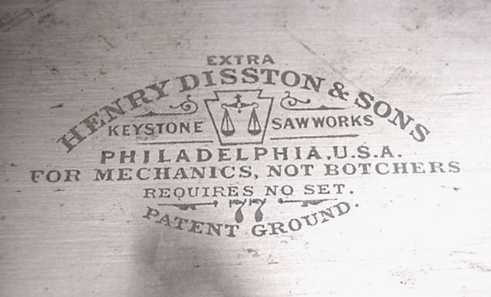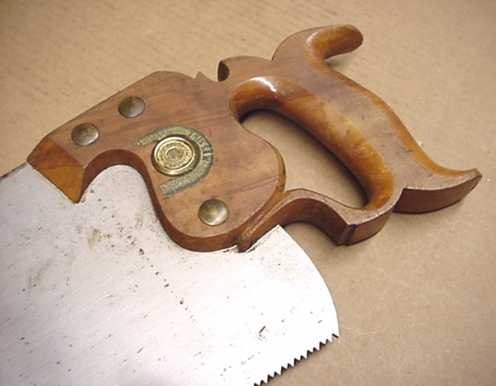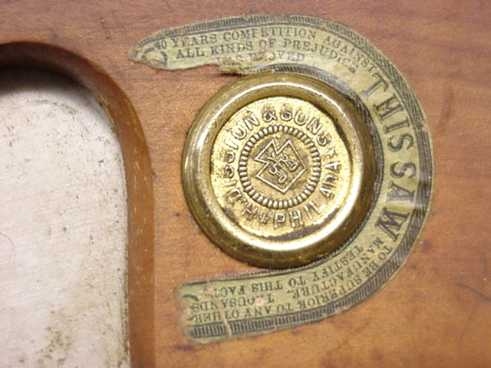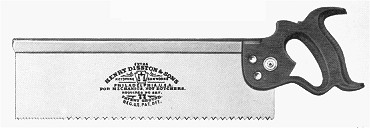No. 77 Handsaw
...For Mechanics, Not Botchers

|
No. 77 Handsaw
...For Mechanics, Not Botchers |
 |
|
One of the rarest saws that Disston made for many years is the No. 77 handsaw and backsaw. The handsaw was a extra-taper ground saw that could be used without any set on the teeth, resulting in a very narrow kerf and a cut so clean it would not to need a shooting plane to finish the task. The No. 77 backsaw was different from other backsaws in the way it was filed. This particular specimen looks like it was put into a toolbox in 1898 and not taken out until last week. The No. 77 featured an applewood handle and a polished extra London spring steel blade, a grade not given to other saws. The No. 12 saw was London spring steel, the No. 99, D-15, and D-115 were extra refined London spring steel. I think it was mostly advertising hype and have tried to back that opinion with research. The blade was extra-tapered in a way similar to the more popular Acme 120 handsaw. However the two saws were not filed the same way, taking a different approach to cross-cutting cabinet-grade wood neatly. The decal appeared on Disston saws throughout the 1890's, and perhaps a little longer. It was a warning that other manufacturers tried to copy Disston's products. It appeared immediately after Disston bought the worst offender, Richardson Brothers, and three other companies * in 1890, forming the National Saw Company, which puttered along for a short period of years until Disston closed that operation. *- Wheeler, Madden & Clemson; Woodrough & McParlin; and Harvey W. Pearce Co. |
 |
 |
 |
This is the No. 77 handsaw, looking much like a No. 7 handsaw. The late model No. 77 had a handle that was less ornate in its shape. This was shortly before it was dropped from production, roughly 1920. It appears in the 1918 catalog, but not in the 1923. An illustration of the later saw handle can be seen in the catalog reproductions at the bottom of this page.
The teeth of the No. 77 saw had an unusual filing. Unlike most crosscut handsaws, which have a bevel on the teeth between 15 and 24 degrees, the No. 77's bevel was 45 degrees. That is the angle between an imaginary line perpendicular to the saw blade and the plane of the saw tooth. The teeth had no set, and the 45 degree bevel was meant to cut wood in a way that saw dust would fall easily from the teeth and keep the path clear for the blade to continue cutting. The rip tooth version of the saw had a five degree bevel; a typical rip saw is zero bevel. The No. 77 backsaw also had the 45 degree bevel tooth filing. The handle was slightly different from the typical Disston backsaw's. The No. 77 backsaw's handle is to the left, a No. 4 backsaw's is shown below it. Both saws have 12-inch blades. It was not a big seller, so they don't turn up often now. The real draw for collectors is the etch. The phrase "for mechanics, not botchers" may have been meant as an ego boost for the user in 1876, but most tool-collecting woodworkers picking up the saw today would be more self-effacing and identify themselves botchers.
No. 77 backsaw handle photo courtesy of Ray Gardiner and his backsaw.net website. |
|
|
|
|
HAND AND BACK SAWS
|

No. 77. Back Saw, Disston & Sons' Mechanic's Own, to run
without set.
| 8 in. | 10 in. | 12 in. | 14 in. | 16 in. | 18 in. | |
| Price | $17.00 | $18.00 | $22.50 | $15.50 | $29.00 | $32.50 |
|
The Saw: How to Use It, How to Keep It in Order:
|
|
Information taken from Disston 1911 catalog: DISSTON, No. 77
|
|
TO RUN WITHOUT SET 
|
|
Information taken from Disston 1914 catalog: DISSTON, No. 77
|
|
CRUCIBLE STEEL "MECHANICS' OWN" BACK SAW, No. 77 TO RUN WITHOUT SET 
|
|
Information taken from Disston 1918 catalog:
DISSTON, No. 77  No. 77. Extra London Spring Steel Blade, Warranted, Apple Handle, Polished, 4 Brass Screws.
Made with Cross-cut or Rip Teeth at the same price |
|
